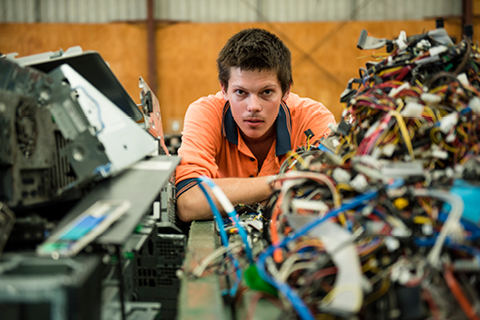Context: Secondary education in Australia is compulsory and the precise requirements vary by state and territory, with education in South Australia being mandatory from ages 6 to 17. Even with an effective legal framework for compulsory education, some youth feel frustrated in mainstream education systems and, as a result, disengage. In 2012, nationally, 8 per cent of youth aged 15 to 19 and 14 per cent of youth aged 20 to 24 disengaged from full-time education without subsequently taking up employment or further training. In Port Pirie, 25 per cent of young people aged 15 to 19 and 56 per cent of young people aged 20 to 24 left school prior to finishing grade 12 (the standard measure of completing secondary education in Australia). Recognizing this issue, the Australian Government has supported initiatives for Flexible Learning Options (FLO) with the goal of preventing secondary dropouts and reengaging early school leavers.
Implementation of programme/ initiative: The FLO Programmes offered by YourTown are part of the Innovative Community Action Networks (ICAN) model, which seeks to engage youth, families, schools, communities, businesses and the Government in supporting young people to complete their education. YourTown is a not-for-profit organization that has been running this programme since 2006 and targets youth aged 12 to 17 years old. The primary objective of the programme is to empower youth with the skills, motivation and resources they need to re-join mainstream education or pursue alterative training and/or employment. A key feature of the programme is that YourTown combines individual case management with alternative education and learning opportunities. In 2015, YourTown’s revenue was AU$83.5 million, 69 per cent of which was generated through its own art unions, 14 per cent from the rendering of services, 10 per cent from government and other grants, 5 per cent from philanthropic and corporate income and 1 per cent from interest and other sources.
Main challenges: The issue of staffing vulnerabilities is a challenge for the programme, as it only employs a handful of staff, so in the event of absence or resignation, the shortage is felt acutely. The programme’s cooperation with the community and integration with schools acts as a counterbalance to this staffing vulnerability so that youth are not left without support. Limited resources, such as a lack of computers and high speed internet connections, at times frustrate staff and students, which risks the disengagement of the youth involved. Well trained and experienced staff make it possible to find creative solutions when resources are scarce.
Results achieved: During an evaluation period in 2012, the programme found that, after 12 months, 59 per cent of youth that exited the programme pursued further education and/or employment placement. Another 35 per cent stayed with the programme for an additional year to receive support. Among those who left the programme, one third had a confirmed education, employment or training opportunity, 9 per cent re-engaged with mainstream education and 21 per cent transferred into YourTown’s job placement programme. Of the youth who took part in a Certificate II programme (vocational training), 64 per cent successfully received accreditation. The majority of youth who disengaged with education as a result of parenting obligations transitioned into YourTown’s parenting support group.
Moving Forward: Starting in 2012, YourTown began a large scale tracking programme on the outcomes of past participants in order to assess long-term results. This is part of a larger effort by YourTown to increase assessment of programmes both as a means to improving the programmes and to ensuring future funding.
Replicability: The experience of YourTown in South Australia affirms the need for programmes to provide a suite of integrated resources that offer youth with different options. In the case of YourTown’s programme, this includes re-joining mainstream education, alternative education, training, employment or a combination of different types of learning. Another tool that greatly contributed to YourTown’s success was tailored assistance based on individual case management.
References:
YourTown’s Website, available from: https://yourtown.com.au/what-we-do#school-retention-and-re-engagement
Megan Price, “Alternative education and transition pathways for early school-leavers,” (Milton: YourTown , 2013), available from: https://yourtown.com.au/sites/default/files/document/BT-Alternative-Education-And-Transition-Pathways-For-Early-School-Leavers-Report.pdf
Project Details
Date: September 23, 2016
